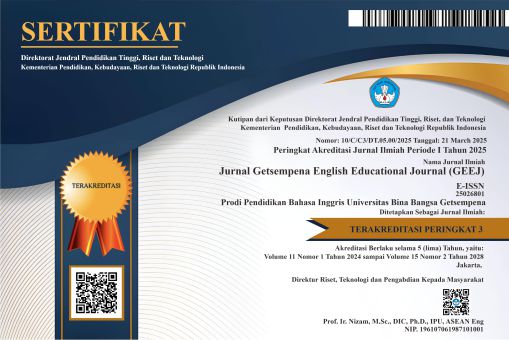Ethical Guideline for Getsempena English Education Journal Publication
The ethical policy of the Getsempena English Education Journal (GEEJ) serves as a foundational framework for building a coherent and respected body of scholarly knowledge. It reflects the quality of the work produced by authors and their supporting institutions. Peer-reviewed articles uphold the scientific method, and maintaining high ethical standards is essential for all parties involved in the publication process: authors, editors, reviewers, publishers, and the broader academic community.
The Editorial Board of GEEJ is committed to upholding integrity throughout the publication process. We take our responsibility seriously and ensure that commercial considerations, such as advertising or reprints, do not influence editorial decisions.
GEEJ adheres to the ethical guidelines established by the Committee on Publication Ethics (COPE), available at https://publicationethics.org.
Publication and Authorship
- All submissions undergo a strict double-blind peer reviewprocess by at least two national or international reviewers with expertise in the relevant field.
- Review criteria include relevance, scientific soundness, originality, significance, clarity, and language quality.
- Editorial decisions may result in acceptance, acceptance with revisions, or rejection.
- A request for revision does not guarantee acceptance.
- Rejected manuscripts will not be re-reviewed.
- Manuscripts must comply with legal requirements concerning libel, copyright, and plagiarism.
- Duplicate publication is strictly prohibited.
Responsibilities of Authors
- Authors must ensure that their work is originaland has not been published or submitted elsewhere.
- Authors are expected to participate actively in the peer review
- All authors must have significantly contributedto the research.
- Authors must provide accurate and authentic data.
- Authors are responsible for disclosing conflicts of interestand identifying all sources used.
- Authors must notify editorsof any errors discovered post-publication and cooperate in retractions or corrections.
Responsibilities of Reviewers
- Reviewers must treat all submissions as confidential.
- Reviews should be conducted objectively, with constructive feedback and without personal criticism.
- Reviewers should identify any relevant uncited workand notify the editor of any potential plagiarism or overlap.
- Reviewers must disclose any conflicts of interestand recuse themselves if necessary.
Responsibilities of Editors
- Editors hold final authority on acceptance or rejectionof manuscripts.
- Editors must ensure the quality and integrityof the journal’s content.
- Editorial decisions are based on the importance, originality, and clarityof the submission.
- Editors must remain impartial and must not reverse decisions without valid justification.
- Editors must uphold reviewer anonymityand ensure research meets ethical standards.
- Editors should actively investigate and respond to allegations of misconduct.
Publication Decision
The editorial team of GEEJ is responsible for deciding which manuscripts are accepted for publication. This decision is guided by the manuscript's quality, originality, and alignment with the journal’s scope, as well as relevant legal and ethical standards.
All submissions will be screened for originality using Turnitin or equivalent plagiarism detection software.
Fair Play
Manuscripts will be evaluated based solely on their academic merit and relevance, without discrimination based on the authors’ race, gender, sexual orientation, religious beliefs, ethnic origin, citizenship, or political views.
Confidentiality
The editorial team and staff are required to maintain strict confidentiality regarding all submitted manuscripts and must not disclose information beyond what is necessary for the review process.
Conflict of Interest and Disclosure
Unpublished materials disclosed in a manuscript must not be used in an editor’s or reviewer’s own research without explicit written permission from the author.
Duties of Authors
Reporting Standards
Authors should provide an accurate and objective account of their research, including sufficient detail for replication. Fraudulent or knowingly inaccurate statements are unethical.
Originality and Plagiarism
Manuscripts must be entirely original. Any borrowed content must be properly cited or quoted.
Multiple and Concurrent Publications
Authors must not submit the same manuscript to more than one journal simultaneously. Duplicate publication is unethical.
Authorship and Contributions
Authorship should reflect those who made significant contributions to the study. All co-authors must approve the final version and agree to publication.
Acknowledgement of Sources
Proper credit must be given to the work of others through appropriate citations.
Disclosure of Conflicts of Interest
Authors must disclose all potential financial or personal conflicts of interest and funding sources.
Fundamental Errors
If an author discovers a significant error in their published work, they must promptly inform the editor and cooperate in issuing a retraction or correction.
















